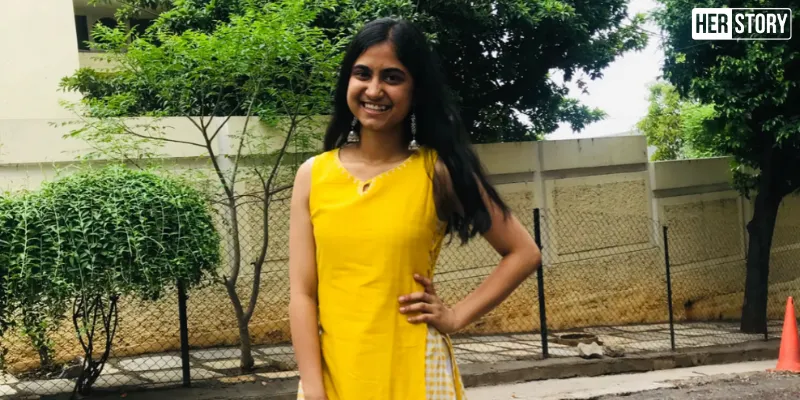Meet the 22-year-old rapper whose feminist anthem is asking all the right questions
Pratishtha Patny, a Hyderabad-based Hindi rapper’s first song Ghanta Na Hoga was released on International Women’s Day this year. She is also a motivational speaker and a self-help coach.
Pratishtha Patny vividly remembers singing along to Justin Bieber’s 2011 hit Baby. But it wasn’t the entire song, it was the rap portion by Ludacris that she remembers rapping to.
Love the way you lie by Eminem was the first rap song she learnt to sing completely. Even today, she is fascinated with rap music and while others are stuck on singing just the chorus, she loves the challenge of mastering the tougher nuances of a rap song.

Pratishtha Patny
"I like doing it. It is a medium for me to convey my thoughts and feelings. Also, because my personality is like that (rap). I want to feel the rush and I like challenges," says Pratishtha who goes by the rap name Da Storm.
Apart from being a Hindi rapper, the 22-year-old is also a motivational speaker and self-help coach who is keen on helping people understand themselves better.
Rapping the necessary
After trying out rap and doing covers of other rappers, Pratishtha decided to pen down her own thoughts and write her own lyrics. Six months ago, she began writing and released the official video of her first rap song Ghanta Na Hoga on International Women’s Day this year.
She calls the song a “feminism anthem” and rightly so. It speaks of the trials and tribulations of being a woman, menstruation and the taboos associated with it, the constant trouble that people have with women’s clothes and lifestyles, the influence of mass media on eve-teasing and harassment and the idea of keeping women and girls sheltered to ‘protect them’ and the fight for women’s rights.
She goes on to rap how people have a problem with women, the clothes they wear, the makeup, drinking alcohol and everything they do. She even sings about how women are harassed and their cases are not filed by the police and many other problems they face.
The idea to write the song was suggested to her by her friends and supporters. She believes the prompt led her to write all the things that women couldn’t say out loud.
“The song has a lot of statements but also a lot of questions.
I just want us to question more, introspect more and ask questions to the society and to ourselves. Why should I not go to the temple when I am on my period or why do I have to sit separately or not touch pickles or not go to the kitchen. Before you just accept what people ask you to do, question them. Rebel if needed, deny if needed, draw boundaries if needed or run away if needed, if an extreme measure is needed take it, if a small measure is needed, take it,” she implores.
In the song, she even makes a reference to the idea of feminism being equated to male bashing or hating, which should not be the case.
“I feel the wrong kind of feminism is being propagated – over-enthusiastic feminism without knowledge. It spoils the whole cause for equality,” she says.
She feels that the inclusion of kindness, compassion, and empathy in our conversations on feminism are needed to advance the rights of all.
Apart from feminism and women’s rights, Pratishtha is interested in creating rap that touches upon less-talked upon issues, that need to be addressed to make a social impact.
However, she wishes to explore and understand the rap culture in her own city, Hyderabad before she enters into more collaborations and writes new songs. With six months of knowing people in the rap community and building her contacts, she is now hosting a week-long Instagram live series of hip-hop music workshops with locally renowned artists.
Her Instagram space is also a place for her to talk of socially relevant issues. She also created an Instagram photo series called the 'Gender Non-conformity Project' that defies gender roles for women and men.
Helping people become true versions of themselves
Pratishtha graduated with a Psychology degree in 2018 from St Ann’s College in Mehdipatnam, Hyderabad. She was always curious about human behaviour and wanting to know the answer to: why do people do what they do?
Pratishtha suffered from depression and worked hard to come out of the phase. She employed a lot of combinations of methodologies from psychology, read stuff, reached out to people, spoke of her troubles, which helped her come out of the dark phase in her life. Taking cue from her own experiences, she believed she could help people become their “better selves”.
Utilising her knowledge of psychology and experiments from her own life, she helped people deal with issues like procrastination, low self-esteem, and instilled a sense of self-belief and confidence by becoming a motivational speaker and self-help coach. To help people on a bigger scale, she started Blue Raccoon workshops, where she conducts growth coaching and helps people with methods to deal with their issues, and change their lives for the better.
“How can I be there for someone and help them take alternative decisions, which can change their lives?” is the motive behind these workshops, she says.
From battling depression to being an outspoken rapper and helping others, Pratishtha says that ultimately you get to decide how your life has to be. "You may take perspectives from others, they may be right or not. At the end of it, you get to decide. For as long as I am taking my own decisions and not allowing someone else to take them for me, I can always learn from my mistakes, grow and own my story and not have regrets,” she says.
Edited by Rekha Balakrishnan









